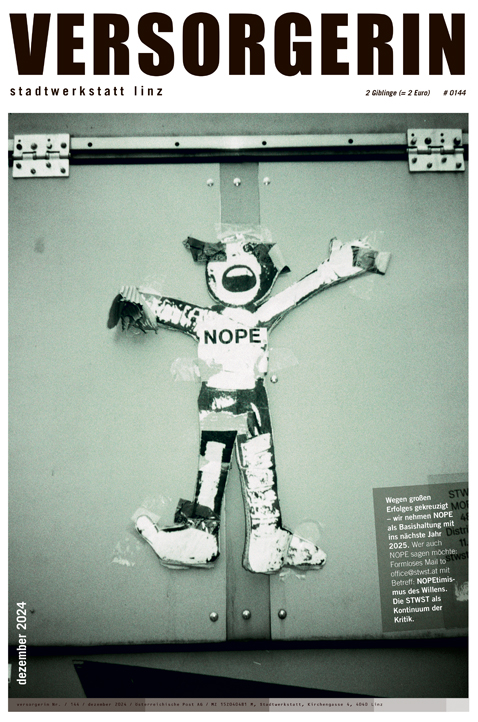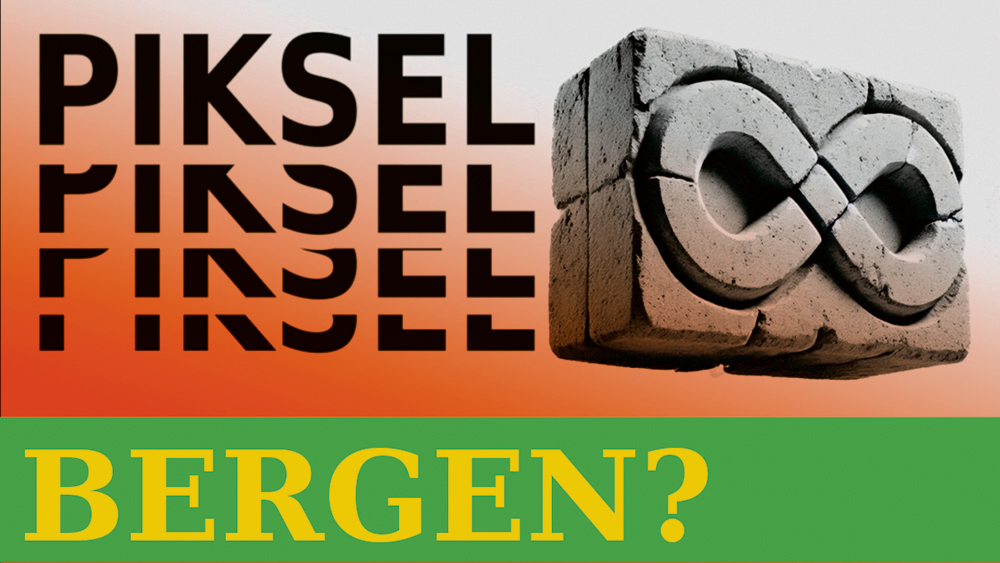Versorgerin: Gisle and Maite, you direct and curate Piksel Festival. Can you briefly give us an impression of what your festival for Electronic Art, Technological Freedom is all about? Specifically, this year‘s programme was titled »Geo-v(oid)(0)latility(∞)politics«. I think, we all can summarise global developments as »polycrisis, metacrisis, permacrisis«. Accordingly, you had a very drastic, but I also think poetic title. We saw absolut dystopian projects like »Droning« live on site, hopeful ones like »Ohanda«, works between gaming and poetry and of course much more. Perhaps you can give us a general impression of your intentions behind the programming.
Gisle Frøysland and Maite Cajaraville: The theme for this year specifically addresses the frustration and disappointment that culture, artists, and society are facing nowadays. With multiple fronts of war and injustice driven by figures that undoubtedly belong to a dictatorial past, we witness how our politicians either have their hands tied or how society is somehow held hostage by these leaders, who ultimately benefit only certain specific countries. We question the cynicism of politicians who funnel resources into the hands of a few while allowing society to fall into the abyss.
.jpg)
(Foto: Tanja Brandmayr)
The ups and downs of politics, both here and around the world, can leave us feeling like we’re on the edge of a void—a place where constant changes and unpredictable decisions chip away at our trust, our solidarity, and our hopes for lasting progress. When political agendas shift so often, it’s easy to lose sight of the solutions we desperately need. Issues like climate change, social equality, and cultural preservation get left hanging, caught in a limbo of uncertainty. This shaky ground divides us further and weakens the bonds that help us grow together, drawing us closer to a void where true progress feels harder and harder to reach.
Amidst this shift, the Piksel festival for electronic art and technological freedom, continues to stand strong in this guerrilla warfare of cultural impact. Our intentions are to create a connection between technology and society through art installations and pieces that aim to explain, interpret, and explore how, why, and what we can do with technology. We seek to discover alternative ways of using it and to »hack« the narratives imposed on society bringing in Bergen a robust lineup of artists presenting a critical electronic art exhibition, audiovisual performances, workshops, and presentations addressing these topics.
Versorgerin: As part of the performance programme, there was the »Media()Messe«, in which you two also took part as performing artists, the Stadtwerkstatt was also represented here with three people coming, and two other initiatives, APO33 from France and MADLab from Cyprus.
I see this cooperation as special: It brings together festival organisers, who themselves do artistic practice, so to speak. In this context, I would like to ask you about the importance of an expertise between organising a festival like yours - and a very fundamental permanent own activity as artists and critical producers, in a greater freedom of art, media and technology. I believe that this kind of expertise, which can particularly arise in artist-run spaces, is indispensable: Developments are anticipated and critically reflected upon that will reach society years later. And to come back specifically to the »Media()Messe« we did together: In this sense I see this as a statement that society is in an absolute mess, with all the crises we are deeply in. We have to ask ourselves how we want to live. But as artists we also have to ask ourselves the question: Which are the media we actually want to work with? I think it has always been a battle between commerce and open access. But in a way, it‘s also true that a technological development has lost its innocence: We see technologies that promised a better world 30 or 40 years ago and now, on their high end, are currently being used in an increasingly dystopian or even warlike way. Where is the path through the mess?
Gisle Frøysland and Maite Cajaraville: The Media()MESSe program has been a significant gathering this year at Piksel, bringing together 10 artists running labs across Europe. Media()Messe labs share a common focus on the Free/Libre and Open Source movement, not only as a strategy for regaining artistic control over technology but also as a way to highlight the deep connections between art, politics, technology, and the economy.
We believe that working with free/libre technological tools encourages artists to critically examine the broader impact of technology on society and explore how it shapes our world. Over its 22 editions, Piksel has addressed themes such as cybersecurity, privacy, social media profiling, the commodification of personal data, biotechnology through DIY “kitchen bioart”, and the gamification of life through the AI warfare algorithms. The festival also celebrates innovations like DIY musical instruments and promotes the development of sustainable technologies, empowering communities through shared knowledge. These efforts create collective resistance against the growing attacks on electronic art and other societal movements currently under siege.
The power of media chaos lies in the interstitial spaces — the gaps where creative resistance can thrive. Projects like Media()Messe, Ohanda, and IDLE demonstrate that free/libre artist practitioners can continue to build these spaces, whether virtual or physical. The collective energy generated by such collaborations provides participants with a temporary »mirror« to reflect on their work and instills hope in society. By presenting these projects, we extend these interstitial spaces to local audiences and new practitioners, ensuring their relevance and growth.
Media()Messe also underscores the importance of alternative networks, which are increasingly under threat. Protecting and expanding these resistance spaces is vital to sustaining creative freedom and fostering societal resilience.
Versorgerin: And now to the shock that awaited us right at the start of the festival. After so many years of absolutely important and indispensable international work, the Piksel Festival is threatened with budget cuts. We as the Stadtwerkstatt cultural association are absolutely appalled at how short-term the thinking is here! I mean, we know Bergen primarily through your work. I‘m convinced that Ars Electronica, the world wide operating festival we co-operate with every year, and its audience from all over the world, also know Bergen through the Piksel Festival! You are not only doing a great job here as a free technology and art festival, but you should actually receive a medal from the city government in Bergen for city marketing, because you are putting Bergen on the map for many people, at least from an international perspective. We would think that your city should double and triple the funding instead of cutting it! At the same time, however, we also know that it is precisely these initiatives that work so far into the future that always have a very difficult time. Especially in times when commercial visitor numbers or similar parameters are only considered in the very short term. Many people often don‘t realise that completely different ranges are created in these areas: I mean, the people who are present at Piksel Festival are both experts when it comes to artistic and tech content and they are also multipliers in terms of a worldwide audience and important future issues. When I talk about the multiplier fact and the fact that you put Bergen on the international map, I talk about 112.000 visitor of Ars Electronica Festival in the Year 2024 for example. Seems like a big damage for Media Art but also for the Cultural City of Bergen is happening here? Is there still hope that the city of Bergen recognised that and will support you after all? And how can our readers support you?
Gisle Frøysland and Maite Cajaraville: We have summarized our arguments to support Piksel in our petition and deeply appreciate everyone who can sign it. It will also help to write a letter of support or leave a comment —it is a vital show of support that uplifts our spirit of freedom. Thank you!
-------------
PIKSEL 24 - Geo-v(oid)(0)latility(∞)politics
21st - 24th November, Bergen Norway, piksel.no
-------------
STWST in Bergen: https://newcontext.stwst.at/projects/piksel_2024
-------------

